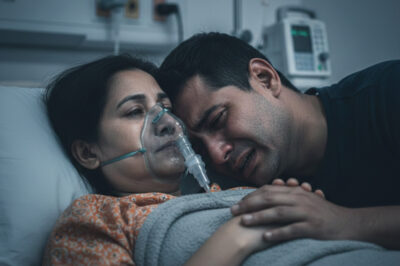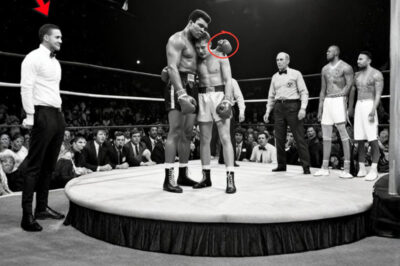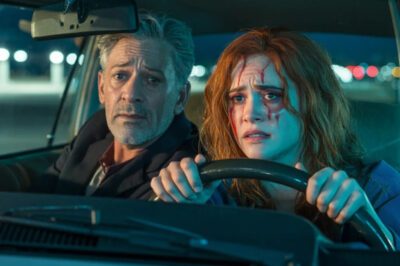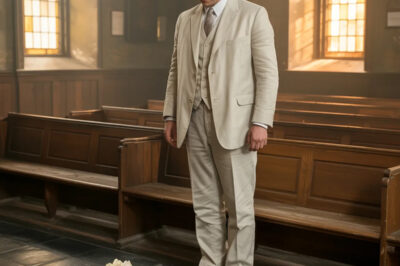An Unexpected Encounter on the Mexico–Querétaro Highway
The Boy Hidden in the Truck
In the midst of the scorching sun beating down on the Mexico–Querétaro highway at noon, a man abruptly stopped his truck on the shoulder. His usual calm expression disappeared when he heard an unusual sound coming from the back of his vehicle. Lifting the cover of the truck bed, he was paralyzed: a boy, hidden for half an hour without his noticing, was holding an old, worn photograph in his hands.
The man, named Ernesto Ramírez, was 45 years old and worked as a civil engineer. He had recently accepted a job that would force him to move from Querétaro to Mexico City. He had lived alone for almost ten years after his marriage to Lucía ended. It wasn’t for lack of love, but because of poverty, constant arguments, and especially his absence during crucial moments in his son’s life.
That morning, Ernesto gathered his belongings and loaded them into his truck. This trip symbolized a new chapter: a better-paying job and the hope of rebuilding his life, though he felt it might be too late to forget the past.
At exactly ten o’clock, he left his neighborhood in Querétaro. The road was clear, allowing him to put on a José Alfredo Jiménez CD and let memories and melancholy accompany him on the journey. Everything seemed in order.
However, after half an hour on the highway, he heard a soft noise, a “crunch, crunch,” from the back. He checked the rearview mirror but saw nothing unusual. Then, a small cough broke the silence. Ernesto tensed.
“Could someone be inside the truck?” he wondered, heart pounding. Without hesitation, he slowed down, turned on the hazard lights, and got out with trembling hands. Opening the back door, he found nothing. But hearing another noise inside the closed bed, and although it seemed impossible for anyone to have gotten in, he instinctively decided to investigate.
When he lifted the cover, he discovered a boy of about ten, thin, in dirty clothes and with an old backpack, looking at him with fear but also with firm determination.
“I’m not stealing anything, sir!” said the boy, curling up in a corner.
Ernesto’s heart sank.
“Who are you? Why are you here?” he asked.
The boy was silent for a moment and then pulled a photo from his backpack. In it, a young man held a baby; the image, though faded, showed that the adult looked very much like Ernesto.
“My mom told me you are my dad,” he confessed.
A cold sensation ran through Ernesto’s body and his knees almost buckled. He could barely believe what he was hearing.
“What was your mom’s name?”
“Teresa Mendoza. She died. Before she left, she told me that if I was ever alone, I should look for my dad. She said he was an engineer named Ernesto who lived in Querétaro. I asked the doorman where we lived and he told me which house was yours.”
Ernesto remembered Teresa, the kind woman who had been his love in his youth. They had a deep love, but when he lost his job and fell into debt, Teresa left. He never knew she was pregnant or that she’d had a child.
“Why did you get into my truck?” Ernesto asked.
“I was afraid to talk to you, I thought you’d reject me. But when I saw you packing, I hid in the bed. I just wanted to go with you, if you really were my dad.”
Ernesto felt his world collapse. For years he had lived alone, regretting past mistakes, never imagining that a child would come to call him father. The situation was too overwhelming to take in.
He knelt down and looked at him closely.
“What’s your name?”
“I’m Mateo.”
With a trembling hand, Ernesto reached out.
“Come on, get in the cab. Let’s talk a bit.”
Mateo hesitated at first, then took his hand.
As the truck continued down the highway, Ernesto’s heart pounded. The man who thought he would be alone forever now had a child beside him. There were no documents to confirm it, just a photo and the boy’s word.
Mateo watched the scenery, silent, hugging his backpack with a mix of excitement and nervousness.
Ernesto wrestled with doubts and uncertainties, questioning whether it was all true.
Every time he looked at those eyes so similar to his own as a child, the uncertainty faded bit by bit. Although the silence between them was heavy, it didn’t feel uncomfortable, but rather full of unanswered questions.
Upon arriving in Mexico City, Ernesto took Mateo to his small apartment in the Narvarte neighborhood. It wasn’t big, but enough for two people now.
He prepared a simple dinner: eggs with beans and tortillas. Mateo barely ate, although it was clear he was hungry. He looked around with curiosity and silence.
“Do you want to go back to school?” Ernesto asked.
Mateo looked up, hesitant.
“I stopped going when my mom got sick. I don’t have a birth certificate.”
Ernesto felt a lump in his throat thinking of a child without papers or family, unprotected.
That night he called a doctor friend to ask about DNA tests, which would take about ten days. He decided to care for Mateo while waiting for the results, no matter what happened.
Ten days later, he received the result. He read only one line: “Confirms father-son relationship.”
A smile spread across his face until tears welled up in his eyes.
Key: From that moment, Ernesto’s life took a definite and positive turn.
Every morning he took Mateo to a community school that accepted undocumented children, with the promise of regularizing his situation soon. Mateo showed dedication, good behavior, and intelligence, according to his teachers.
For his part, Ernesto learned to be a father from scratch: making breakfast, helping with homework, and teaching him to ride a bike. He also learned to listen, something he never knew how to do, not even in his marriage.
When Mateo slept, Ernesto would look at the old photo from his youth with Teresa and the baby. Many times he cried in silence, grateful for that unexpected son.
Not everything was easy.
One day, his older sister Carmen visited and, seeing Mateo, asked suspiciously:
“And who’s this boy?”
“He’s my son,” Ernesto replied confidently.
“Since when do you have a son? With whom?”
“With Teresa, do you remember her?”
Carmen fell silent, then said skeptically:
“How do you know he’s your son?”
“I did the DNA test. He’s my son.”
“And the papers? What if someone claims him?”
Ernesto clenched his fists firmly.
“I don’t care. I know he deserves a decent life.”
Carmen sighed and concluded:
“You’re as stubborn as ever… But if this makes you happy, go ahead.”
That night they had dinner without arguing, for the first time in many years.
A year later, Mateo had a birth certificate listing Ernesto as his father. His status had been regularized and he was about to enter secondary school. Ernesto took on extra jobs to pay for private lessons.
The day Mateo got his school ID, he asked:
“Are you tired, Dad?”
Ernesto smiled and ruffled his hair:
“No, son. Now I feel like I’m truly living.”
Mateo just squeezed his hand tightly, a sign of trust built not only by blood but by everything they had shared.
Second chances in life are rare, but sometimes, at the most unexpected moment, a small sign can completely transform our ideas about love and family.
Ernesto thought he had lost everything, but in reality, his life was just beginning thanks to a boy named Mateo.
Ultimately, this story reminds us that hope and family bonds can arise when we least expect them, forever changing the course of our lives.
News
Aun así, Aarón guardó silencio. Miró a su hija de cuatro años—acurrucada bajo la cobija, aferrada a su osito de peluche mientras dormía profundamente—y entendió que él no tenía derecho a romper aquel hogar…
Aun así, Aarón guardó silencio. Miró a su hija de cuatro años—acurrucada bajo la cobija, aferrada a su osito de…
Ella dejó a un hombre sin hogar negro ducharse en su casa. Cuando terminó, se desmayó al verlo…
Ella dejó a un hombre sin hogar negro ducharse en su casa. Cuando terminó, se desmayó al verlo… Una joven…
El peso de los puños rotos
El peso de los puños rotos El aire dentro del Olympic Auditorium de Los Ángeles, aquel 15 de marzo de…
En el estacionamiento del aeropuerto de la Ciudad de México, encontré a mi hija dormida dentro de su coche junto a sus gemelos. Le pregunté: —¿Dónde están los ocho millones de pesos (150 mil dólares) que invertí en tu startup? Rompió en llanto. —Mi esposo y su familia se llevaron todo… me hicieron pasar por loca. Sentí que se me nublaba la vista. —Recoge tus cosas —le dije—. Vamos a arreglar esto ahora mismo.
En el estacionamiento del aeropuerto de la Ciudad de México, encontré a mi hija dormida dentro de su coche junto…
Lo dejaron plantado en el altar, y él se casó con su esclava que tanto lo amaba…
Lo dejaron plantado en el altar, y él se casó con su esclava que tanto lo amaba… Ella lloraba escondida….
El peso de lo invisible
El peso de lo invisible Don Esteban Montoya entendía el silencio mejor que nadie. En su mundo, el ruido solía…
End of content
No more pages to load













